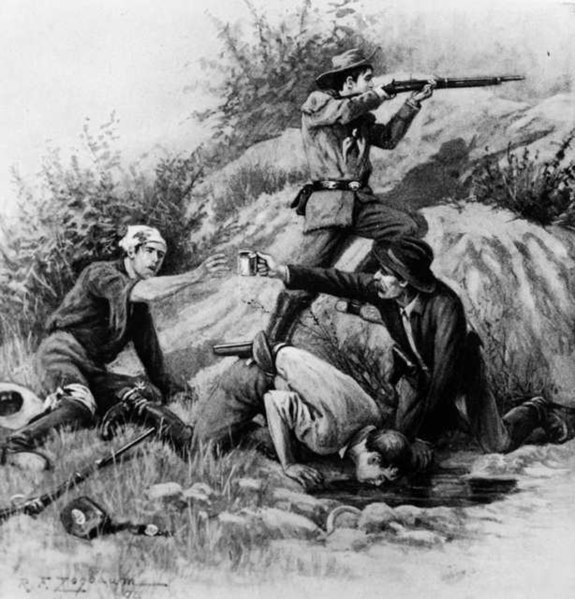This is a kill-or-be-killed western with a very high body count. Something like 20 named characters die in one way or another, plus a lot of hostile Indians and all but
one of a troop of cavalrymen. Death comes in various ways, including fever,
infection, torture, and a grizzly attack. There are also flashbacks to Civil
War battlefields, carnage, and hand-to-hand combat.
The central
character is a veteran of that war. Having served as a young Confederate
colonel, he is too much his own man to endure taking orders and dealing with
fools in uniform. Along with the occasional PTSD-influenced dream, he has been
deeply affected by the war. He has learned more than a few survival skills, as
well as a coldly business-like way of distancing himself from death. You are a
hard man, someone tells him.
Plot. McKay takes a job on the frontier for the U.S.
cavalry, chasing down a gunrunner who has been selling war-surplus repeating
rifles to the Sioux. His pursuit takes him across the plains from Omaha to
Montana, then south to Missouri. Associated with him along the way are a
settler and his wife, a mountain man, an Indian, and a former slave. Given the
high-risk nature of McKay’s mission, only one of them survives.
The narrative shifts
between pursuer and pursued. The gunrunner is an unpleasant man named Wild
Bill. More than half afraid of the Sioux, he keeps them suitably intimidated by
demonstrating the killing power of a Gatling gun. When they see it used to wipe
out a bunch of mounted blucoats, the Sioux would love to get their hands on one
themselves.
.jpg) |
| U. S. Cavalry, 1868 |
Character. McKay makes for an interesting blend of
frontier ethics. On the one hand, he is a survivalist. He knows how to treat
wounds, fevers, and snakebites, and he repeatedly advocates tireless vigilance
in the face of threats to life. Out here, he advises, you have to protect
yourself and family. Keep a gun handy, eyes open, and shoot to kill.
Meanwhile, he has a
live-and-let-live philosophy. He wastes no time dwelling on the past and bears
no grudges about the war. The Union was better organized and its troops better
supplied. End of story. Bury the dead and move on. He judges another man’s
worth regardless of race, creed, or color. Thus he counts Indians and a former
slave among the men he trusts.
Rarely moved to
emotion, he admits at one point that it hurts him to bury women and children.
And he laments the deaths of soldiers whose last days and whereabouts will
never be known by their loved ones. But dead colleagues who have risked danger
and fought side-by-side with him are buried with a few dry-eyed words said over
their graves. Period. No grief.
Women. McKay, we are told, is not used to being around
“womenfolk,” and they rarely appear in the story. Only one commands his
respect. She is tough and fearless, ready with a gun, determined to make good
on the frontier. But even with that strong hand, she is unable to stay in the
game.
 |
| U. S. Cavalry, 1868 |
His only attachment
is to a young girl, for whom he buys candy. She has lost both parents and
foster parents, and McKay has promised to be her guardian. He would prefer to
be responsible only to himself, he says earlier in the novel, but he’s “not
that kind of man.”
Caveats. This novel is not for everyone. Readers will
enjoy it who (a) don’t care strongly about historical or geographic accuracy,
(b) aren’t put off by gruesomely graphic descriptions of torture and death, (c)
don’t mind a slower pace that allows for digressions and stories within
stories, and (d) don’t care whether characters speak in a modern-day
vernacular.
A firmer editorial
hand would have shortened this novel by 10% or more. Especially in the latter
half, when cutting to the chase would be more effective, the narrative tends to
get talky. Repetition is also a distraction. As one example, characters make an
unusual number of references to the human posterior. The search function on
kindle makes it easy to count them. The word “ass” crops up in conversation 47
times, “butt” 15 times, “rear” nine, “backside” seven, and “buns” once.
Wrapping up. Readers interested in survival skills will find
this novel of interest, and a glance at the author’s bio reveals that Benton is
well schooled in that discipline. As a veteran of many years active duty, he
also creates a believably realistic portrayal of a military setting, from
fumbling fresh recruits to commanding officers of various temperaments and
degrees of competence.
James McKay, U.
S. Army Scout was first
published in 2008, and the kindle edition was released in 2013.
Image credits: Wikimedia Commons
Coming up: Quigley Down Under (1990)

well I tend to enjoy a high body count so this sounds interesting to me.
ReplyDeleteRon, the character of James McKay reminds me somewhat of the main character in Ed Gorman's "Cavalry Man: The Killing Machine," a Union investigator who goes in search of a Gatling gun stolen from the army. I wouldn't mind reading this novel in spite of the caveats; in fact, I want to read some modern-day westerns.
ReplyDeleteSounds like another "Edge" novel, i might read it?
ReplyDeleteHigh body counts usually indicate a badly written book, especially if the victims are nameless and not developed characters, so no reader cares about their deaths. Compare that to Shane, where the main characters are richly drawn, and the reader cares deeply about their survival.
ReplyDeleteCould not agree more.
Delete